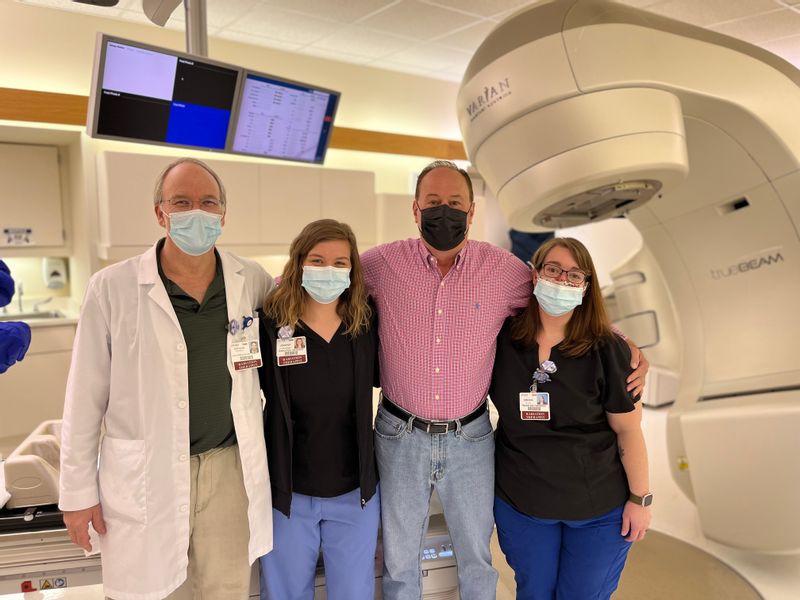“Iredell Radiation Therapy Center Made Me Feel Like Family”

For those with cancer, the thought of radiation can be unsettling. When your doctor recommends radiation therapy, a multitude of worrisome questions may race through your head — “Do I really need radiation? Is it painful? Will it even help my cancer?”
This is exactly how 63-year-old Statesville resident, Scott Ruth, felt when he was told he needed radiation for prostate cancer. He was pleasantly surprised with the care and treatment he received.
In April 2021, Ruth visited his primary care provider for routine blood work. Though he knew his prostate-specific antigen (PSA) level had increased in recent years, he attributed the rising level to age. What his provider told him, however, was not what he expected.
Ruth’s PSA level was 7.8 ng/mL. This was shocking, considering the normal PSA range is between 1.0 and 1.5 ng/mL.
“From then, I knew I was in trouble. I immediately made an appointment with my urologist,” said Ruth.
Unfortunately, when Ruth went to his urology appointment, they found his prostate deformed with a suspicious lump. Ruth set up an additional appointment to get a biopsy, a procedure to remove tissue so it can be examined for cancerous cells. After taking 12 tissue samples, Ruth’s urologist sent the prostate tissue out for lab testing.
When the results of his biopsies came in, Ruth traveled back to his urologist.
“My urologist sat right down in front of me, put his head down, and said, ‘it’s very bad.’”
Ruth had Grade 4 prostate cancer. Luckily, it had not yet spread to other areas of his body, but surgery was necessary.
After weeks of extensive research and advice, Ruth wished to have a special type of robotic prostatectomy surgery to remove his prostate gland and found a doctor in Ohio who would do the surgery for him.
On July 15, Ruth traveled to Ohio, and the next day, he was in surgery. His surgery went well, and after 10 days of difficult recovery, he returned home to Statesville.
Three months after his prostatectomy, Ruth revisited his urologist to get another PSA test. This time, his PSA level came back 0.12 ng/mL. And though this was a huge change from the 7.8 ng/mL he received before his surgery, his urologist wanted to be certain the cancer had not reoccurred.
“My urologist really wanted my PSA level to be undetectable, which is under .1, because there might still be some residual cancer. He suggested I take radiation at the Iredell Radiation Therapy Center,” said Ruth.
Iredell Radiation Therapy Center
Unsure of what would happen next, Ruth set up a consultation at the J. Allen Knox Radiation Therapy Center, on the campus of Iredell Memorial Hospital.
“When you go into the radiation therapy center for the first time, you don’t know what to expect. You’re scared, concerned, and unassured,” he said.
“I sat down with the radiation oncologist there for a consultation. She looked me dead in the eye and made me feel very comfortable about what was about to happen and explained everything,” he added.
After the meeting with his radiation oncologist, Ruth felt much more at ease and began the radiation planning phase called simulation. Computed Tomography (CT) imaging is used during this phase to locate the exact areas that need radiation, so the treatment is accurate and precise.
The radiation oncologist determined Ruth needed 35 radiation treatments, each lasting about 15 minutes, five days a week. Ruth then scheduled his very first radiation treatment for December 20, 2021.
“When you come back for your first radiation treatment, you’re not sure how it’s going to go. But, it’s very easy, and fortunately, I didn’t have any side effects,” said Ruth.
During his first treatment and for the 34 treatments thereafter, Ruth remembers feeling overwhelmingly blessed. He immediately connected with many radiation center staff and happily calls them his friends.
Ruth is especially thankful for the care he received from a radiation therapist on his team, Katie, who made him feel comfortable and relaxed during his radiation treatments.
“My team at the Iredell Radiation Therapy Center made me feel like family. I wasn’t just another number or some stranger,” he said.
Ruth specifically recalls a time when he felt staff went above and beyond to truly make him feel respected and special.
“The radiation therapy team would frequently play music while I was receiving treatment, and one day, I asked for a song request. Tony, a radiation therapist, added songs on a playlist specifically for me while I was having my treatment,” he said.
“It meant a lot to know he did that for me and cared,” he added.
Commuting five days a week to receive radiation may sound bothersome, but Ruth said he actually enjoyed it due to the people there.
“I don’t know how to explain it, but I enjoyed going to the radiation therapy center. It was just part of my day. I really liked my team there and loved seeing them. We would talk all the time, laugh, and commiserate,” said Ruth.
“It wasn’t something that I dreaded,” he added.
Following each of his treatments, Ruth had the opportunity to meet and encourage other patients while they were in the waiting room.
“When I came out of my treatment, I would see other new patients out there. You would see the same scared look on their face that I had. You could tell they were thinking, ‘What’s going to happen? Is this going to help?” said Ruth.
Because of what he now knew about radiation therapy, Ruth felt it was important to share his experience and do his part to uplift others.
He would frequently tell patients, “You’re going to go in unassured, and every case is different, but the people in the back will take care of you, and that’s what stands out.”
“Radiation may not fix this problem, but while you’re here, this group of people will rally after you, care for you, and remember you,” he added.
In return, the other patients offered Ruth advice, support, and meaningful friendships.
“I received more back from other patients than I gave back,” he said.
On February 9, Ruth completed his final radiation treatment. In June, Ruth will revisit his urologist for another PSA test to determine the results of the radiation.
“It takes time for radiation to kill all the cancer cells. They’re still dying off inside of me right now,” he said.
From now until June, Ruth’s main priority is to live his life and enjoy every day he has.
“I used to worry about it a lot. I couldn’t think about anything but the cancer, but I can’t change it. I’ve done everything the doctors have asked me to do. Now, it’s time to enjoy life,” he said.
As he reflects on his experience at the Iredell Radiation Therapy Center, Ruth encourages others to take action, keep a positive attitude, and be their own best proponent.
“If your doctor says you need radiation, do it. Go to Iredell Radiation and at least get information. Making informed decisions is the key, and you have to look out for yourself,” he said.
While he is awaiting the results of how radiation affected his cancer, Ruth remains optimistic and incredibly grateful for the compassionate care he received.
“I just want to say thank you to Iredell Radiation Therapy. I enjoyed every day with you guys, and there’s no question in my mind that I’m better for it. No matter the outcome,” said Ruth.
For more information about the J. Allen Knox Radiation Therapy Center and other cancer treatments, talk to your provider or call the center at 704-878-4615.
Photos:
Top — Pictured, from left to right: Marcy Horton, Clinic Assistant; Scott Ruth; Carla Keever, Clinic Assistant.
Bottom — Pictured, from left to right: Anthony (Tony) Mitchell, Radiation Therapist; Jennifer Wallace, Radiation Therapist; Scott Ruth; Amanda Everhart, Radiation Therapist. Not Pictured: Katie Ballard, Radiation Therapist.































